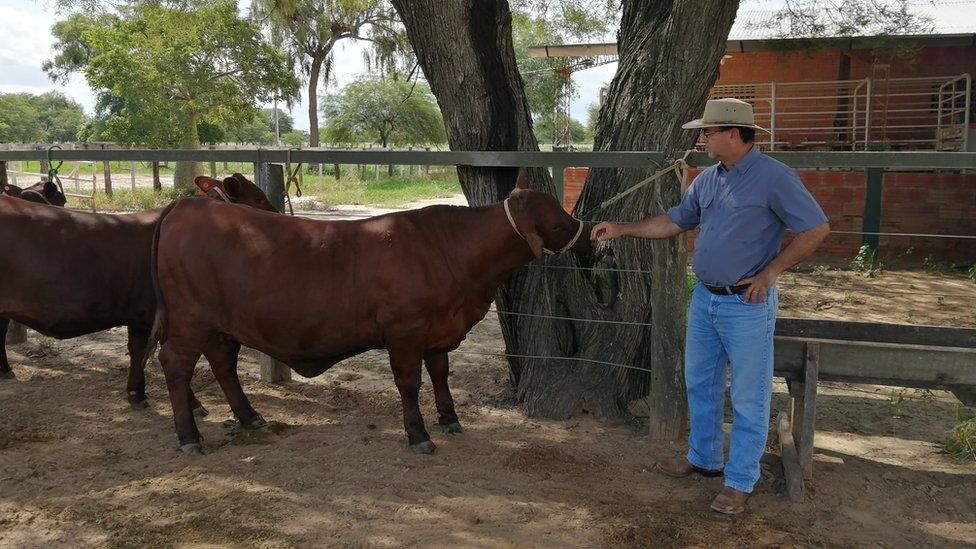Gran Chaco: Will a new road improve or destroy the 'green hell'?
- Published

"A new Panama Canal": that is how Egon Neufeld describes the Bioceanic Highway, a massive transnational infrastructure project which aims to link Chile's Pacific coast with Brazil's Atlantic coastline.
A wealthy landowner in Paraguay, Dr Neufeld says the road - which will span more than 2,200km and run through Argentina, Brazil, Chile and Paraguay - will make it easier for ranchers like him to transport cattle and soybean to port cities on both the Atlantic and the Pacific, from where it can easily be shipped to overseas markets.
The governments of the countries the road will run through have all lent their support to the project, with Mario Abdo, the president of landlocked Paraguay, a particularly ardent supporter.
"Paraguay is the fourth-largest exporter of soya in the world. For the soya to reach the Pacific Ocean, it [currently] has to go via the Panama Canal. Once the new highway is ready, it will generate savings for the entire productive sector of around 25% in logistics costs and take around 14 days less [for the product] to reach large markets," he told the BBC enthusiastically.
About 525km (325 miles) of the new motorway will run through Paraguay's Gran Chaco - a vast scrubland interspersed with wetlands.
It is home to jaguars, pumas, giant anteaters and thousands of plant species, making it one of the most biodiverse places on earth.
The area has not always been kind to those who settled there. When Mennonites, a conservative Protestant Christian group, arrived in the Chaco in the early 20th Century, they dubbed it "the green hell".
Egon Neufeld's grandfather is one of the Mennonites who settled in the Chaco in 1930, escaping persecution in Ukraine.
Almost 100 years later, Dr Neufeld is still battling its harsh environment.
"For us, the biggest problem is that we need to clear weeds from our fields. If you don't keep on top of them, the scrub comes back and takes over everything," he explains.
His community has been successful in taming parts of the "green hell", running multi-million-dollar beef and dairy businesses and driving around in 4x4 trucks instead of the horse-drawn carts still used by some of their brethren in other parts of Paraguay.
Dr Neufeld thinks the new road will offer job opportunities which will draw workers from Paraguay and beyond to the area.
That is something which worries Taguide Picanerai, a young leader from the indigenous Ayoreo, which are some of the earliest inhabitants of the Chaco.
Mr Picanerai's community is already suffering from the effects of deforestation, which has seen large numbers of trees razed to make way for cattle grazing.
Roughly 20% of Gran Chaco's forest, the equivalent of an area the size of New York state, has been converted into farmland or grazing land since 1985, according to Landsat satellite pictures from Nasa's earth observatory.
"The new road will mean there's more cattle farming here, which leads to a huge loss of biodiversity," Mr Picanerai says, adding that he is also worried about further loss of territory for the Ayoreo.
He explains that in the past, ranchers have moved into Ayoreo ancestral lands, restricting their access to water and leaving the indigenous community with less space to hunt.
Life for the Ayoreo has already changed beyond recognition within one generation. Taguide Picanerai's parents used to live deep in the forest, hunting for wild boar and tortoises.
Their community was persuaded by US missionaries who came to Paraguay in the 1960s to give up their hunter-gatherer existence, put on clothes and settle alongside other indigenous communities.
Much of their land was sold to farmers and it has taken years of legal battles for them to reclaim some of it and to move to their own settlement.
"That territory is vital for us," Taguide Picanerai insists.
President Abdo concedes that the new road "will lead to an increased population in the Chaco and more commercial activity". But he thinks that, provided the laws are followed, the impact will be positive.
He told the BBC that there were already strict rules for landowners in place, including a provision that stipulates that the "maximum people can deforest in the Chaco is 50% of their land and even less if the biodiversity of the area is more delicate".
Environmentalist Miguel Lovera says these measures are not enough.
"The building of new roads leads to more deforestation and the forest being cut up into small patches, which puts immense strain on the frail ecosystem," argues Mr Lovera, who leads an organisation lobbying for the protection of indigenous groups in the Chaco.
But Bianca Orqueda, a young singer-songwriter from the Nivaclé indigenous group, can see some positives to the new road.
Ms Orqueda, who runs a music school for local children on the outskirts of the Mennonite town of Filadelfia, divides her time between her community and Paraguay's capital, Asunción.
She welcomes the fact that the new road will speed up the time it takes to get to the capital.
She says she is not convinced it is possible for her community to keep living in isolation, arguing that the Nivaclé need to "move forward", which for some may mean leaving behind the Chaco and their way of life.
"I tell the children that if they want to be doctors, architects, dentists or musicians, they will have to leave [the community] once they finish school and go to another city.
"Here in Filadelfia, there are no universities, there's nothing unless you want to go into farming," Ms Orqueda says.
But for Taguide Picanerai, the conservation of the Chaco is about more than just his indigenous community's way of life.
"The Chaco's rich biodiversity means it's a global issue that everyone should care about," he says, adding that he is determined to protect his land from newcomers who may move in after the new road is finished.